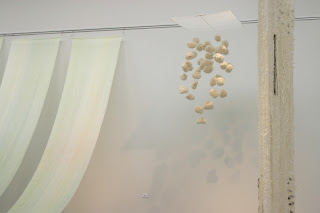 |
| view from our minshiku window |

We heard all about it from the BBC while our short (2 night three day) trip to the lovely fishing island of Toshi jima (答志島). The skies were blue, the beaches lovely, the people hard working and friendly, and the town full of lovely little streets that pull at that ancient memory.

As we strolled the little streets, swam in the beautiful ocean we were reminded once again what a lush and beautiful jewel Japan is. The Japanese have spend hundreds of years in these towns and through hard work and great craftsmanship have honed many things to such an artful state.
I spent a long time looking at the サッパ (sappa). They are beautiful old wooden fishing boats and if you look at them carefully you can see the Japenese skill at building and design. With these marvelous boats the people would go out to harvest their fish from the seas.
 | |||||||||
| unused sappa beached before the tusnami wall |
Here we were on this lovely fishing island and the minshiku we were staying in was empty except for us. The beautiful beaches were left pretty much to the waves and those few rare Japanese who don't want to go where it's popular. What a treat for us but we wished more business for the local people. ( 2 of the 3 coffee shop snaku we saw were closed.) It seems people want more excitement--that this quiet island doesn't keep them entertained--enough. (Though I ate the best, freshest Uni and most delicious Udon for lunch here.)
What to say?? It seems to me that people are continually ready to give up something real and good for an imitation of poorer quality if it is but new. Pokiman moves into Wabi Sabi land and middle age men have little dangling stuffed creatures hanging from their kaban. Plastic is endemic. You can't not find it along the beautiful rivers and washed up on the beaches. It's wrapped around everything you buy--often with two or three layers.
I sometimes feel I'm in Bosen-sei. "Japan is a very safe place," is still the refrain, even as the fish that are so important to it's people become more questionable due to rising mercury levels and collapsing populations. Even as the world economy which Japan is now so dependent on teeters on the brink. And to me the plastic flood seems to be part of this. It looks clean and safe--if it's made in China.
Maybe the lack of real money in the world will catch up to us and we'll stop buying things we don't need--which is about 90% of what's being sold. The earth and oceans will have a rest, crafts and artisans will again be in demand. Items will be valued not only for how many things they can do at once but if they can hold their value for 10, 20 or 50 years. Long live artists and craftsman and what they produce and may the highly colored plastics and modern tastes quickly pass into our collective memory.





























 I
I















